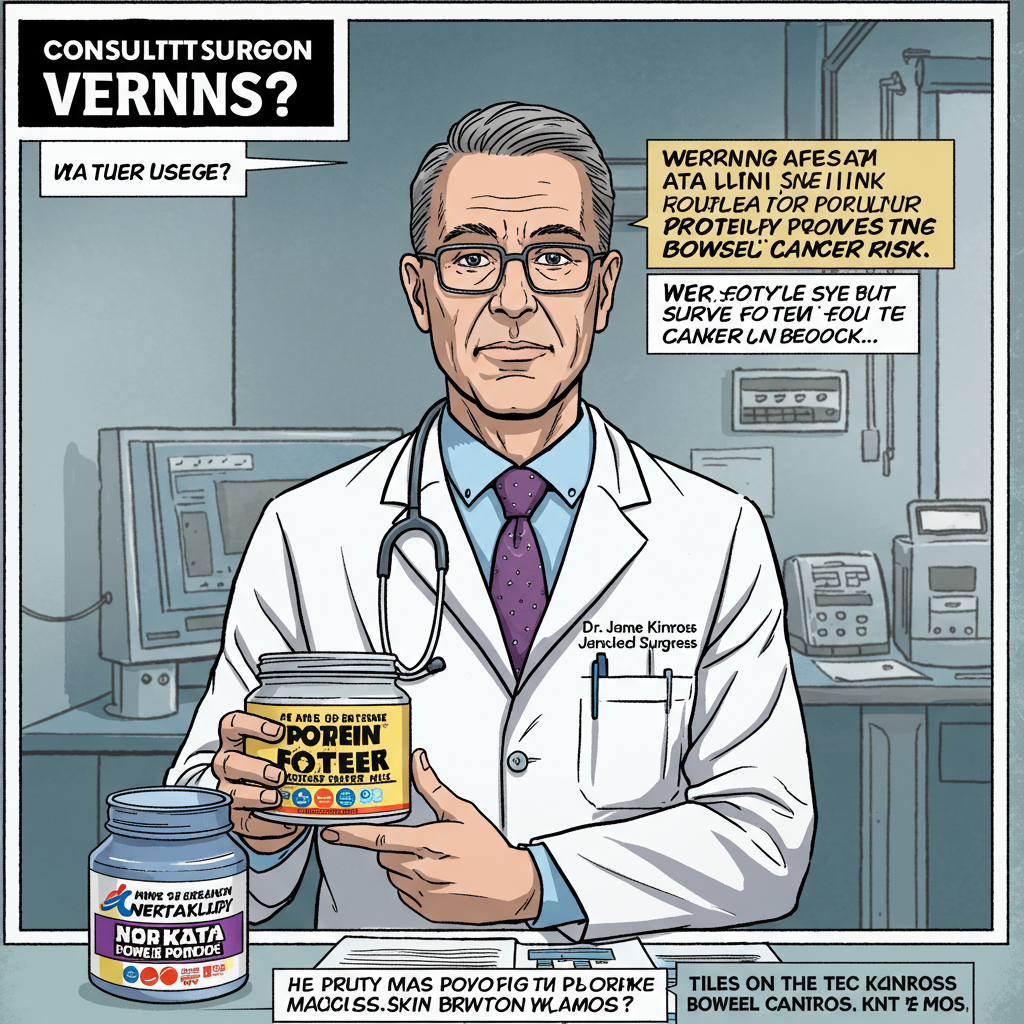A leading expert has issued a strong warning about the potential link between popular dietary habits, particularly the high consumption of protein powders common among gym-goers, and the alarming increase in bowel cancer rates.
Dr. James Kinross, a consultant colorectal surgeon at Imperial College London, expressed concern over what he sees as a modern “gym diet” culture, which he believes can be “unhealthy in its own right.” His message is clear: individuals need to be far more mindful of what they are consuming and its impact on their gut health.
Why Are Protein Powders “Bad News” for Your Gut?
Dr. Kinross doesn’t pull punches when discussing protein supplements. “These protein powders are bad news and really bad for your gut,” he told LADbible. He explains that when the body breaks down and metabolizes proteins from these concentrated sources, it produces toxins. These toxins can fuel inflammation within the gut, a known factor in the development of bowel cancer.
Furthermore, he warns that high protein powders, including types often found in the fitness world, can “profoundly change your microbiome.” The gut microbiome – the complex community of microorganisms living in your digestive tract – plays a vital role in immune response, metabolism, and inflammation, all of which influence colon cancer risk. Disrupting this delicate balance can pave the way for harmful effects. Research suggests this inflammation and the release of toxins can even damage DNA in cells, increasing the likelihood of cancerous changes.
Adding to the concern, many pre-made protein shakes and ultra-processed foods (which protein powders often are) contain emulsifiers like carrageenan. Studies suggest carrageenan can break down into a toxic substance in the stomach, potentially causing intestinal inflammation, ulceration, reducing beneficial gut bacteria diversity, and increasing cancer risk.
The Broader Problem: Processed Foods and Additives
While protein powders are a specific focus, Dr. Kinross’s warning extends to other over-processed foods laden with additives and preservatives. Items like instant noodles, sugary cereals, and packaged snacks can promote harmful changes in the gut microbiome and inflammation, contributing to cancer risk.
Other commonly used ingredients found in processed foods and supplements also raise expert eyebrows. Some doctors advise limiting ingredients like carrageenan (also in plant milks, yogurts, deli meat) due to links with gut inflammation, excessive guar gum (in gluten-free goods, ice creams, sauces, nut milks) which can cause gut issues, and soybean oil (in chips, dressings, ready meals) which is high in inflammation-promoting omega-6 fatty acids.
Dr. Kinross strongly criticizes the widespread availability and marketing of these cheaper, ultra-processed foods, particularly towards younger and more vulnerable populations, highlighting the profit-driven nature behind diets that contribute to poor health outcomes. The issue isn’t just gut cancer; a study highlighted how consuming high amounts of ultra-processed foods is linked to an increased risk of premature death from any cause.
Rethinking Your Protein Sources
Instead of relying heavily on protein powders, Dr. Kinross advises a shift towards whole food sources. His recommendation? “Aim for plant-based proteins [over] animal based proteins.”
He also specifically warns against “powdered fibres and those kind of nutrition counters,” stating they are “terrible for your gut.”
Red meat, another common protein source, should be consumed sparingly. If you choose to eat red meat, Dr. Kinross suggests it be high-quality and considered “a once a week thing. It’s a treat.” He explains that red meat contains specific compounds broken down by the body into metabolites thought to cause harm and contribute to cancer risk.
However, you don’t need to go fully vegan for a healthy gut. Simply replacing one portion of red meat per week with a serving of white fish or chicken can significantly reduce your bowel cancer risk. The key is moderation and variety, avoiding meat with every single meal.
Understanding the “Three Pillars” of Bowel Cancer Risk
According to Dr. Kinross, three main factors contribute to an individual’s risk of developing colon cancer:
- Genes: Your inherited genetic makeup plays a role, although hereditary cancers account for a smaller minority (around 5%) of cases. Detection methods for these are improving.
- Environment: This pillar includes external factors you’re exposed to, such as dietary choices (ultra-processed foods, unhealthy protein sources), environmental contaminants like microplastics, and various toxins.
- Microbes: The balance and composition of your gut microbiome are crucial. It’s not just about having too many “bad” bacteria, but also about lacking enough beneficial ones.
The Alarming Rise in Younger Cases
One of the most significant concerns highlighted by experts is the worrying increase in bowel cancer diagnoses among younger people. Global research indicates an 80 percent increase in diagnoses among young adults over the past 30 years, with data showing a 7.3% annual rise in cases for those aged 30-39 in the UK alone.
A major challenge in this younger demographic is that early symptoms often mimic common, less serious gastrointestinal issues like IBS, celiac disease, or simple bloating and constipation. This overlap can lead to misdiagnosis and significant delays in receiving the correct treatment. Personal accounts show individuals having symptoms dismissed for months or even years before a cancer diagnosis is made.
Recognizing the Signs and Seeking Help
Being aware of potential symptoms is crucial, especially given the rising rates in younger adults and the potential for misdiagnosis. According to the NHS and patient experiences, key symptoms of bowel cancer can include:
Changes in your pooing habits (frequency, consistency, difficulty)
Blood in your stool or bleeding from your bottom (even a small amount is not normal and should be investigated)
Feeling like you need to poo even immediately after going
Persistent tummy pain, particularly low in the abdomen
A lump in your tummy
Persistent bloating
Unexplained weight loss
Feeling very tired for no reason (often due to anemia caused by bleeding)
Specifically watch for:* Stools that are significantly thinner or smaller than usual, which can indicate a blockage.
If you experience any of these symptoms, particularly if they are persistent or worsen, it is vital to consult a doctor.
Early Detection and Advocating for Yourself
Dr. Kinross stresses that bowel cancer is highly preventable and curable if detected early. While standard screening ages vary (currently 50 in Scotland, soon to be 50 in England, and 45 in the US, with debate about lowering further), he urges anyone who is worried, regardless of age, to seek medical attention.
Given that early symptoms can be vague or dismissed as common issues, experts and patients alike emphasize the importance of being persistent and advocating for yourself if you feel your concerns aren’t being taken seriously. Simple fecal tests can provide initial insight into risk, while a colonoscopy remains the “gold standard” for diagnosis.
In summary, while protein is essential, the source and overall dietary pattern matter significantly for gut health and long-term cancer risk. Reducing reliance on protein powders and processed foods, prioritizing whole plant-based options, moderating red meat, and being vigilant about potential symptoms are key steps in protecting yourself against rising rates of bowel cancer.



